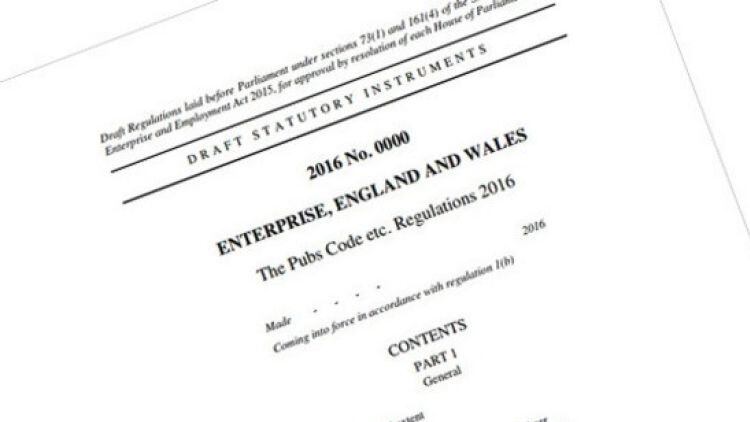The pubs code was created in 2017 to govern the relationship between pub tenants and large pubcos where the two parties had a ‘tied’ lease, meaning landlords took a portion of revenue from beer sales.
Disputes between tenants and landlords over how the code should be applied are decided on by the pubs code adjudicator (PCA) Fiona Dickie.
The code states tenants can request to have their rent independently revaluated to be in line with market rents – the market rent-only (MRO) option – and for a result to be provided within 90 days of the requests.
However, witnesses claimed the code allowed landlords to instead demand an arbitration process that could take two years, at added expense to the tenant.
British Pub Confederation chair Greg Mulholland claimed the legislation had been a “wholesale failure”, and called for an inquiry into what had gone wrong.
The pubs code was founded on two principles, he continued. The first was that it should facilitate fair and lawful dealing, and the second was that the tied tenant should not be worse off than the free-of-tie tenant. However, said Mulholland, these had not been upheld.
Scandalous situation
Mulholland also called the beer tie the “biggest rip off in Britain today”, as it involved charging tenants “extortionate, inflated, above-market” prices for beer.
The conclusion, he said, was tenants were scared of going MRO. “[There have been] broken promises from ministers to Parliament who assured the House of Commons and House of Lords they would legislate and do it properly, but they’ve failed to do so,” he added.
Forum of Private Business managing director Ian Cass also criticised the MRO option. While the option was supposed to be based purely on market rent, rather than market rent plus the margin lost selling products, which was putting publicans off choosing it.
Cass also called the role and performance of PCA Fiona Dickie “disappointing”. While he sent in 102 examples of bad behaviour to the body, he claimed nothing was ever done to handle them.
The Hand & Flower, Olympia, west London licensee Hayley Tansey said the PCA had taken a side, but “not our side”, and did not feel her voice was heard.
She had lost “faith and trust” in the process, and felt the current PCA was not approachable, with events held costing too much time and money for publicans to afford.
Tenants felt “very, very betrayed”, added Mulholland. He said the adjudicator had only conducted one investigation, had ignored systematic abuse of dilapidation bills and section 25 notices and had done nothing for MRO tenants who were charged full rents during lockdown.
Aggressive and troublesome
Campaign for Pubs chair Paul Crossman continued this critique. He had hoped for an adjudicator who would champion publicans’ problems, but instead, publicans’ issues were seen as an “aggressive and troublesome factor”.
Dickie stated that the witnesses had not given facts nor data to back up their general allegations. She pointed to a tied-tenant survey, conducted independently by market research company Ipsos Mori, that revealed the temperature in the regulated tied sector.
She said the methodology for the survey showed Mori had interviewed both publicans and pubcos for the survey, and she had upped the number of tenants involved from 400 to 600 for better comparison.
Dickie claimed she met with a range of stakeholders, yet always asked them to give her evidence of assertions. She said she had not declined to meet with anyone and her office “has its ears open all the time”.
However, when pressed on this point, she said she had not met with the British Pub Confederation since 2018. She said it was possible that the organisation, as well as the Campaign for Pubs, were included in meetings about partnership strategy in May this year.
Dickie also said she had worked to prevent malpractice, imposing a £2m fine to Star for 12 breaches of the code. She was also confident the MRO was being delivered in line with Parliament.
“The MRO process, could and I would like to say should, be part and parcel of every tied rent review so tenant can get the best deal”, she added.
The group also claimed the code was applied differently to non-tied and tied pubs during the pandemic – with pubcos giving more rent concessions and discounts to tied pubs in a way that Mulholland found “clearly discriminatory”.
However, pubcos disagreed. Spokespeople from Punch Pubs, Star Pubs and Bars, Stonegate and Marstons said while tied tenants were supported better, this was because the nature of the MRO arrangement meant tenants opted out of that close partnership.
Star Pubs and Bars operations director for the North Mick Howard, for instance, had put more than £1m rent support behind payment plans, with the vast majority of MRO tenants accepting that.
Ed Hancock, Marstons group operations director and group property director, also agreed sensible repayment strategies with tenants, with Punch Pubs chief executive Clive Chesser stating the pubco supported free-of-tied tenants better than elsewhere in the commercial world.




